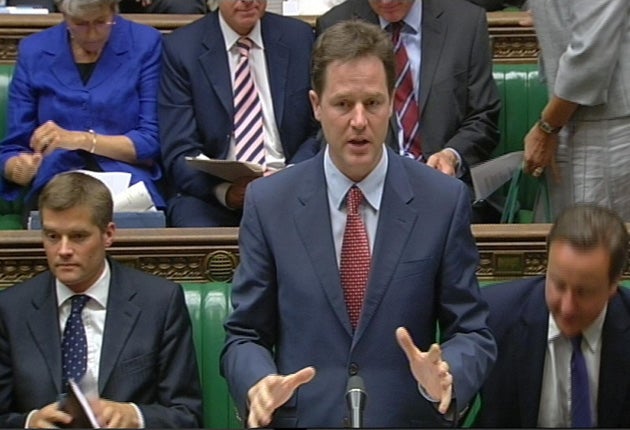Plan to allow coalition to cling to power scrapped
Clegg confirms 5 May referendum on electoral reform

Nick Clegg, the Deputy Prime Minister, announced the first major climbdown by the coalition Government yesterday when he abandoned a plan that would allow a Prime Minister who has lost the support of the Commons to limp on in office.
Instead, he opened up the prospect that a vote of no confidence in the Government would be followed by 14 days of frenetic horse trading while the Prime Minister tries to save his job. After that, if no one can claim to have the backing of the Commons, there will be snap general election.
This is a departure from convention because in the past, the Prime Minister always resigned after losing a vote of confidence. The last time was in March 1979, when Labour's James Callaghan was defeated on a confidence motion by just one vote – and Labour was out of power for 18 years.
But Downing Street pointed out that there was no law to force a government to resign. And the new rules will form part of the legislation that will introduce fixed-term parliaments. David Cameron will be the first prime minister to deny himself the right to call a general election when it suits him. The next one is scheduled for 7 May 2015.
Mr Clegg set an even higher hurdle if MPs want to bring forward the date of the election without passing a vote of no confidence. In that case, it will require a two to one majority.
Though Labour welcomed the change, the shadow Justice Secretary, Jack Straw, could not resist have a dig at Mr Clegg for the "first major U-turn". "Why didn't you think before about the implausibility of a government hanging on after it had lost a vote of no confidence by a simple majority?" he asked. "It would have saved you a great deal of embarrassment."
The announcement was part of a package of constitutional reforms set by Mr Clegg. He also confirmed that on 5 May next year, the Government intents to hold the first UK-wide referendum for 36 years, giving voters their first chance to alter the system under which MPs are elected.
But it became clear that Mr Clegg's reforms had few enthusiastic supporters. Almost the entire Conservative Party, from David Cameron down, thinks that First Past The Post should be retained, and that the Alternative Vote system, which will allow voters to express a second and third choice, will work to the disadvantage of the Tories.
The Tory MP Eleanor Laing was the first dissenter on the government side yesterday. She suggested that the rules for the referendum should be adjusted so that a "yes" vote would be valid only if it was supported by a fixed proportion of the whole electorate, not just those who turned out to vote. If the turnout was low, the result would be discounted.
And David Davis, who was Mr Cameron's main rival for the Tory leadership five years ago, objected to holding the referendum on 5 May, claiming that there would be higher turnout in Scotland and Wales, where there are local elections that day, than in much of England.
But that potential rebellion is likely to be easily dealt with by Tory whips, because the Conservatives have successfully insisted that the AV system can be introduced only if it is coupled with a cut in the number of MPs, from 650 to 600, and the constituency boundaries are redrawn.
The present boundaries tend to work in favour of the Labour Party, because seats in Wales, Scotland, and in the English inner cities on average have smaller electoral rolls than the more prosperous, Tory-voting English constituencies. Staff at Conservative headquarters have calculated that "at worst", what the Tory will lose through the introduction of AV they would get back through the boundary changes.
The Government's insistence on linking reform with new boundaries has infuriated Labour MPs who were previously in favour of AV. Mr Straw said Labour would not allow its support for AV to be a fig leaf for what he called "outrageously partisan proposals" to "gerrymander" constituency boundaries and introduce an "equally arbitrary cut in the number of MPs".
To complete Mr Clegg's problems, he came under attack from MPs who think that the Alternative Vote is a half measure. The Labour MP Austin Mitchell taunted him with not having "the guts" to fight for full proportional representation – which Liberal Democrats want, but which all Tory MPs and many Labour MPs oppose.
The Liberal Democrat MP Mike Hancock told the BBC: "Proportional representation in its truest form is what the British people deserve. This is second-best and for that reason I think a number of people are not very enthusiastic about it. But at least it is a step in the right direction."
Join our commenting forum
Join thought-provoking conversations, follow other Independent readers and see their replies
Comments
Bookmark popover
Removed from bookmarks